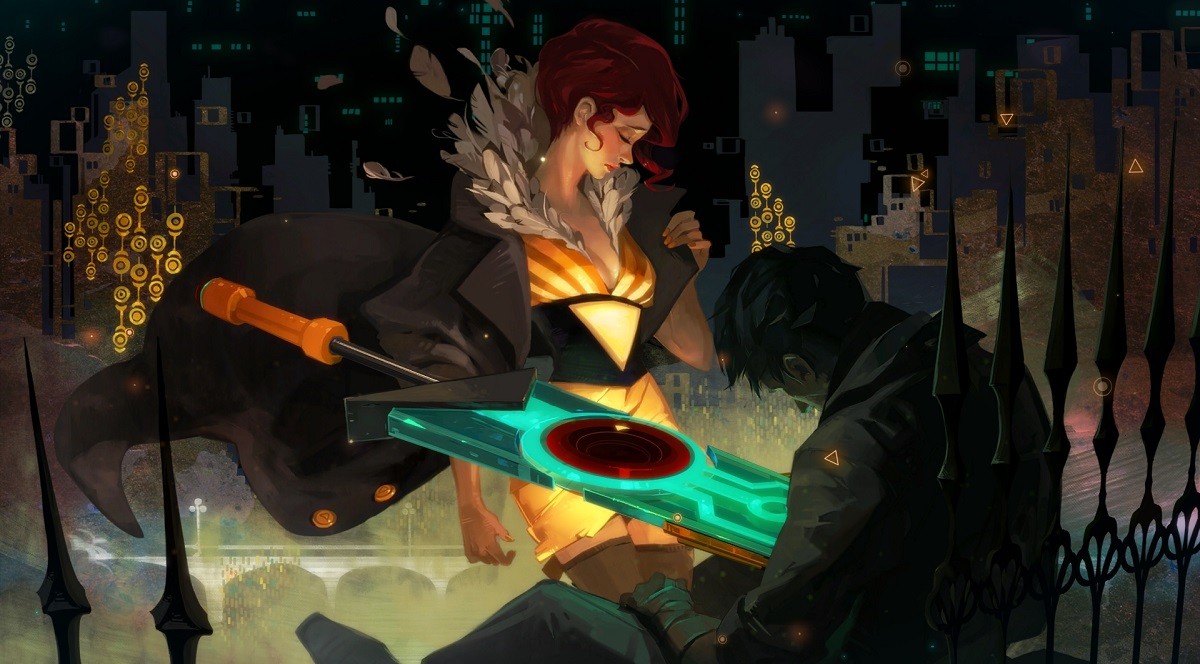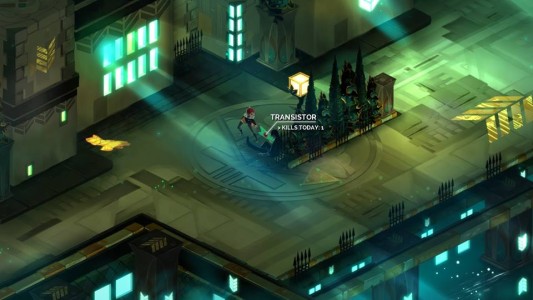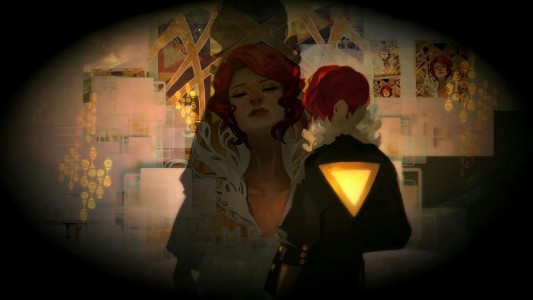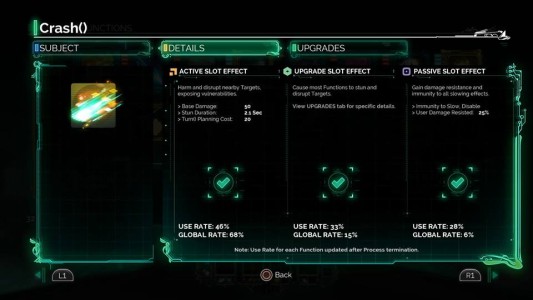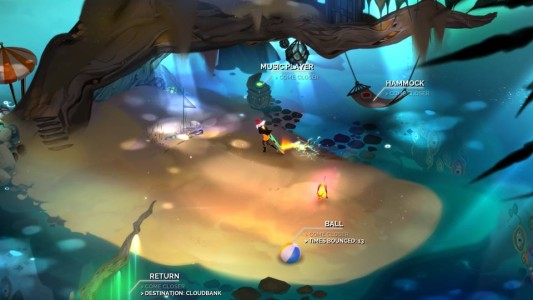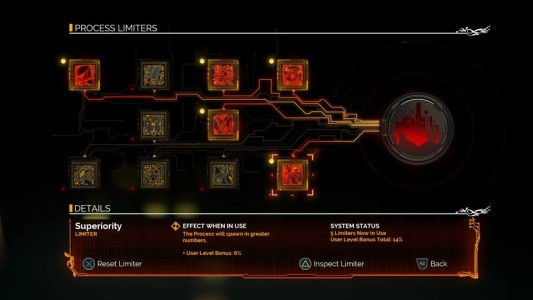“Hello world . . . you don’t look so good.”
Picture a future where technology has become such a source of survival and art that everything is made from it: the post office, the weather, panini melts delivered to your door in seconds. Consider the coding processes that it takes to maintain all of these aspects of our lives. Now picture those processes going haywire and destroying it all. That is the landscape of Supergiant Games‘ second title, Transistor.
You play as Red, a famous songwriter and vocalist who inhabits the floating city known as Cloudbank. Cloudbank has been experiencing a number of disappearances over the past year or so of very talented and respected individuals. Some of them the best in their field. Without giving too much away, Red has recently come into contact with the source of these disappearances, an organization called the Camerata. As a result she has lost her voice and most of her lover. All that she has left of him is his voice which is trapped inside the sword-like device (the transistor) that killed him. Your experience begins with Red ripping the transistor out of his lifeless body.
The world of Transistor is made up of cyberpunk, jazz, and the art of the Vienna Secession. For the most part, these aspects of the game’s visuals and audio overlap; the surroundings possess a digital architecture with golden decor full of shapes and spirals while the soundtrack has strong jazz, blues, and folk roots but does not shy away from fast-paced drum and bass to accompany it. To summarize, Transistor is easily one of the most gorgeous game worlds I’ve ever had the pleasure of losing myself in. Off the top of my head, it’s hard to recall a better one.
After Red takes the transistor, we follow her through Cloudbank trying to discover why the city is falling apart, battling technological enemies on the way to searching for a way to save her lover. Along her journey, you discover bits and pieces of answers that reveal the story as well as abilities and statistical upgrades. Transistor tells it’s story in an incredibly unique fashion that rewards those who explore. But we’ll get to the story later.
Each ability in the game is unique and serves as a “function,” one of the many direct allusions the game makes to programming. Each function has three effects: active, upgrade, and passive. For example, the function called “crash()” has an active effect that damages and stuns enemies making them vulnerable, an upgrade effect that causes most other functions to adopt it’s stun trait, and a passive effect that gives Red damage resistance and an immunity to attacks that slow her down.
After unlocking enough functions, this level of variety opens customizing your approach to combat to a nearly endless world of possibilities. When I unlocked Jaunt(), I was like a kitten with a ball of yarn. This function lets you dash around enemies to give you the upper hand (and most importantly, gets you easily behind enemies for extra backstab damage). But upgrade Jaunt() with Flood() and it leaves a trail of electricity in your wake that damages enemies over time. Or upgrade it with Load() to cause a massive explosion at the destination of your dash. Mixing and matching functions is extremely satisfying when you find what works for you.
There are two main approaches to combat. Encounters begin in real time but you can trigger your Turn() to freeze the world around you and plan your attack, each move taking up a portion of your turn. When you’re ready to execute, Red performs everything you’ve instructed in rapid succession before you’re back in real time waiting for your next Turn().
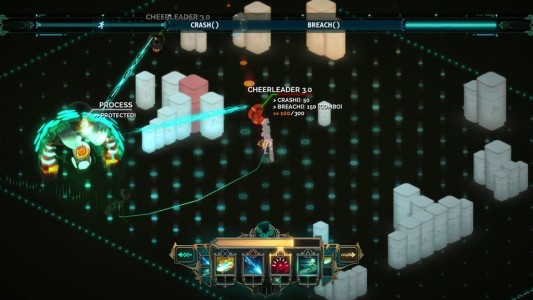
You can imagine the importance of setting up your functions so that you can be effective in both real time and Turn() planning. Experimenting with different function combinations can come with the risk of not fully understanding how it will execute. Thankfully, there are areas scattered throughout the game called Backdoors that take you to a surreal electronic beach environment that contains a door to a practice area allowing you test different combinations. It also includes doors to several tests that assess your abilities with planning, survival, and speed. I found myself learning most about my playstyle here, without the threat of temporarily losing one of my functions due to my health bar being depleted.
Upon leveling up, you will gain access to new functions, more memory to equip additional functions, and limiters. Limiters are optional ways to make the game more challenging while increasing your leveling progress. It’s a great way to test your limits and push your abilities as far as you can with great rewards. But what I found most rewarding about Transistor was it’s new game+ mode (a.k.a. Recursion). In your second playthrough you keep all your stats, functions, and level from the previous game while enemies grow more relentless. But once you’ve unlocked all the functions, you begin to get extra copies of the same functions each time you level up! This way, you can use a function like Jaunt() in it’s active slot allowing you to maneuver in and out of sticky situations while reaping the benefits of it’s passive effect: 125% less Turn() recovery allowing you to activate your Turn() quicker and more often! It’s madness, really.
Throughout Transistor‘s story, Red’s lover speaks to you directly from the transistor and acts as a sort of narrator while also expressing his longing for Red and hope that they figure this situation out so they can see each other face to face again. For the PS4 version of the game, you can adjust the settings so that he speaks through the controller. I found this to be an audibly satisfying way to immerse myself in the world. You learn more as you progress through the game and find “OVC Terminals” where news articles and voting polls are displayed.
But my favorite aspect of story-telling lies within the functions themselves. In the beginning of the game, functions are found from the bodies of those who have long-since become missing persons of Cloudbank, highly creative artists, physics-defying athletes, or influential politicians. Their personalities take a new form as a function to be used at your disposal. And whenever you use a function for one of it’s three effects, you learn a little about who that person used to be and what happened to him/her. I love the idea that these individuals were so good at their craft that not even death could stop them; that self-expression has the power to transcend death.
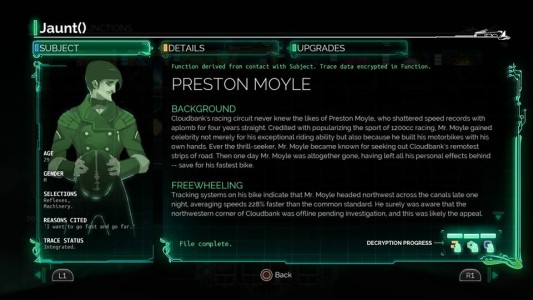
With the plethora of ways Transistor tells it’s story, the cherry on top is the voice work. Red’s lover stuck in the transistor (Logan Cunningham) all at once sounds supportive, scared, and lonely while helping Red get through her journey. However, some of the greatest voice work I’ve heard in a game has to come from one of the members of the Camerata, Royce Brackett (Sunkrish Bala). Calculating, manipulative, and logical beyond morality, listening past the words he’s saying you can hear a part of him that bares a sense of regret and deep self-reflection. Though Red has lost her voice, you can hear her humming and singing throughout the game thanks to Ashley Barrett. She also performs vocals in the Transistor soundtrack.
Typically, any given video game presents it’s different aspects and gameplay experiences separately; stories are told in cutscenes, exploration takes place strictly in the neutral game, combat or battles shift player perspective. But Supergiant Games has found a way to take all of Transistor‘s gameplay DNA and weave it into a harmony that serves for more than just a video game experience, it serves as a personality. Playing Transistor is an experience I took deeply into my most mushy soft heart places and it won’t be leaving any time soon.
You can grab this game for PS4, XBox 360, PC, Mac, and Linux for the absurdly reasonable price of $19.99. For more about Transistor and Supergiant Games’ first title, Bastion, check out their website.

